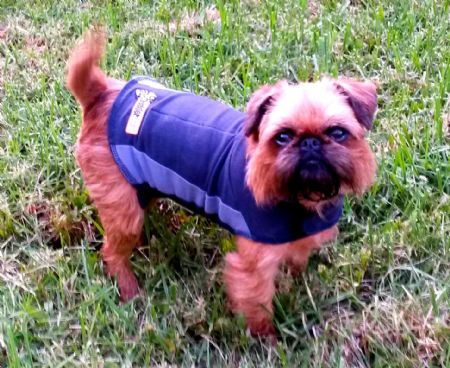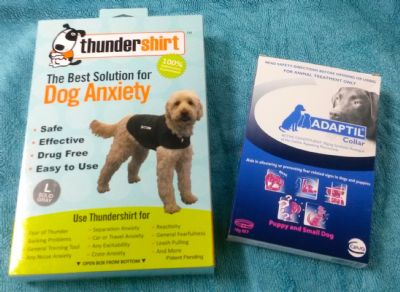Ask Dr Iain-Anxious Griffons

Virginia modelling her 'thundershirt'.
Anxious Griffons!
Although our Breed Standard states that the characteristics of a Griffon are that they are a ‘smart little dog with disposition of a terrier’, they aren’t always. Not even all Terriers have the disposition of a terrier! Griffon’s, like any other dog, can occasionally be born with anxiety problems or much more frequently, they can suffer anxiety due to poor socialization during those critical early weeks of puppyhood or due to a frightening experience. Just like us, they can have phobias to certain situations and we can’t always fathom why one dog has a phobia to say thunderstorms, fireworks, people wearing hats, larger dogs or smaller dogs while another dog in the same household doesn’t.
Our Club's Co-Vice President and Secretary, Beth and Kathy, who both have vast experience in dog training and socializing will agree that giving puppies lots of experience in meeting people, other pups, dogs or cats, encountering vacuum cleaners and all sorts of other situations with reassurance and rewards goes a long way to preventing anxiety issues. However, even with the best training program we might end up with an anxious dog that sometimes will need veterinary assistance to at least alleviate the problem.
Non-prescription remedies
Many readers are aware of my experience with Virginia, who as a Baby Puppy in a show ring was surrounded by a posse of yapping and snarling escapee Chihuahuas! Before this episode she was a confident and well adjusted Griffon but now was anxious in show ring situations. She still loved going to Shows and being on the show trolley outside the ring and often was reasonably confident when surrounded by other Griffons but would ‘lose it’ when around other breeds. Here is some advice which could be applied to other anxiety situations that I was given by other experienced exhibitors, Judges and behavior therapists, all of whom I have the greatest respect for;
-‘keep taking her to shows and she’ll grow out of it.’ Not unreasonable, further experience without the input from Chihuahua’s might have her realize that she was safe.
-‘don’t take her to shows for awhile.’ Not unreasonable, has worked for some dogs but if it doesn’t then you have lost valuable time in trying to rehabilitate them. Might be more applicable to a dog that is becoming bored with a situation rather than being anxious.
-‘pick her up and cuddle her tightly when she shows anxiety to reassure her that she is safe.’ Not unreasonable to try this as providing physical reassurance can reduce anxiety (see ‘Thundershirt’ below) but some dogs could associate the ‘rewarding’ experience of being cuddled with displaying anxiety, just like some dogs will continue other problem behaviours because they receive some attention from their owner, even it the attention is being yelled at, as it is better than no attention at all! I felt that Virginia didn’t respond to this approach for this reason, but another dog might.
-‘don’t pick her up at all. Just stay with her on the lead at your feet, avoid eye contact and ignore the anxiety until she ‘shivers’ her anxiety out and then reward her when she relaxes, holds her tail up rather than having it clamped down between her legs and can focus on you and not the situation around her.’ I tried this and felt that it did help but would advise also using a remedy, whether non-prescription like the Bach Rescue Remedy, Thundershirt, DAP collar or prescription medication, for reasons described below.
-‘use Bach’s rescue (pet) remedy.’ Not unreasonable. Many have found this to be helpful. Most people recommended several drops, given orally, starting the night before the show, the morning of the show and perhaps just before going in the ring. It is a homeopathic style remedy of flower essences +/- a minute amount of brandy. Any reasonably safe medication that reduces anxiety will be helpful; no one can be expected to ‘learn’ to cope with a situation whilst they are in a state of anxiety. So, I opted to keep taking Virginia to Shows but gave her this remedy in the hope it would reduce her anxiety and help her more quickly ‘learn’ that she was safe and had nothing to fear in the Show environment. In Virginia’s case I wasn’t convinced it helped a great deal but for many other cases it has certainly helped. Unfortunately no particular non-prescription or prescription medication will work for every dog in every situation, sometimes you need to try a few before you have success!
-‘use ‘Executive Vitamin B’ tablets.’ Vitamin B supplements can be safe in moderation and many people have had success giving a tablet (or say ½ tablet for a Griffon size dog) daily for a few days leading up to a show and the morning of a show. I wasn’t convinced that this helped Virginia but we both did have a Vitamin B tablet each before Shows for a long time!
Other non-prescription remedies recommended by many vets and others,
- Adaptil collars. The Adaptil (DAP, Dog Appeasing Pheromone) Calming Collar is a recently released remedy for any anxiety disorder that can affect dogs. DAP is a pheromone naturally produced by lactating bitches which acts on the nervous system of their pups to give them psychological reassurance to explore and cope with their environment. This is a contributing reason why many hand-reared pups can end up with phobias and separation anxiety problems. DAP has a similar effect on older dogs as well. It can be synthetically produced and is available as a plug-in diffuser to use in the home, ideal for separation anxiety sufferers but not ideal for travel and show anxiety! It is also available where it is impregnated into a collar that the dog can wear. The collar is sealed in a foil package, which once opened and applied snugly to the dogs neck will start releasing the pheromone and gradually start reducing any anxiety experienced by the wearer. Unfortunately you can’t take the collar off and reseal it and expect it to work again later! Once opened it will release the odourless pheromone for about a month and then needs replacement. It requires warmth for the pheromone to be released so applying it loosely around the neck will reduce its effectiveness. If it is a very windy day then its effectiveness will be reduced too!
The big advantage is that it works continuously in reducing anxiety while the dog learns to cope with the situation and so may eventually no longer need the collar. I’ve had much success in recommending this collar and many vet clinics will sell it over the counter although a consultation may be recommended and sometimes insisted upon by some vets before they may sell it to you. With Virginia, it was obviously removed before she went into the Show ring! It is expensive, many clinics sell them for about $80 each but I’d expect the price to gradually come down over time. I found for Virginia that the next option was better for her particular problem but DAP collars certainly have helped many dogs.
-‘Thundershirts’- are available commercially although the principle behind their effectiveness can see other dog jackets and cooling vests (whether activated by soaking in water or not) having a similar function. As mentioned earlier, being cuddled will have a calming effect on most dogs but you can’t cuddle a dog continuously and especially if you aren’t with the dog whilst they are suffering a separation or thunderstorm like anxiety! Similar tight fitting jackets and weighted blankets have been used with much success with young children with anxiety problems for many years.
A ‘thundershirt’ can be applied tightly on the dog when anxiety is anticipated and left on. These shirts have proven to be a great aid for many dogs and are available in all sizes. Again, they have the advantage of working continuously while the dog learns to cope with the situation and may end up becoming unnecessary. I felt that Virginia’s ‘thundershirt’, which would be applied the morning before we left for a Show then taken off before she went into the Show ring, was of benefit.

Prescription medications.
Sometimes your vet might need to be consulted and there are some vets available who have further qualifications in animal behavior problems. Your vet or behaviour specialist might suggest training strategies for your dog’s particular phobia. Examples include desensitization therapies for dogs with thunderstorm and firework phobias where you will invest in a recording of these noises (or download them onto a computer or iPod) and have sessions very gradually exposing the affected dog to increasing volumes of the noise. It might be relaxation cues that you practice before leaving a dog with separation anxiety on their own but only leave them for initially very short periods using the same routine and if they are coping then try longer periods before returning. Free running exercise, obedience training sessions and environmental enrichment such as providing chew toys can all have a place in treating a dog with anxiety or other behaviour problems.
Whatever the therapy is, we will often prescribe an anti-anxiety medication. As mentioned earlier, dogs and people can’t learn to cope with their phobia whilst in a state of anxiety. Some drugs are better than others for certain situations and sometimes it takes a couple of trials to find the best medication for each particular dog especially if side effects are experienced. For example, we might prescribe Alprazolam to give dogs that have thunderstorm and firework phobias. Dogs with separation anxiety or situational anxieties like Virginia’s might be prescribed Clomicalm (clomipramine hydrochloride) or Reconcile /Lovan /Prozac (fluoxetine). Always consult a vet and have them prescribe a medication if necessary before using these type of drugs as there can be side effects, such as gastrointestinal upsets or in the case of fluoxetine there can be increased aggressive tendencies shown in some dogs.
Iain Mitchell B.V.Sc (Hons), MANZCVSc.
Contact Details
President: Mrs Colleen De Haan [email protected]
Secretary -Mrs Robin Simpson [email protected]
